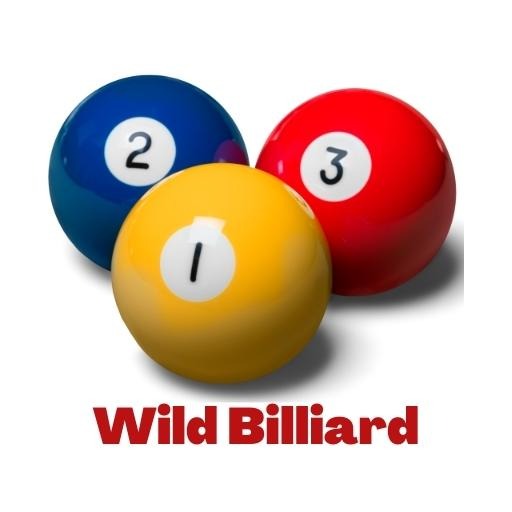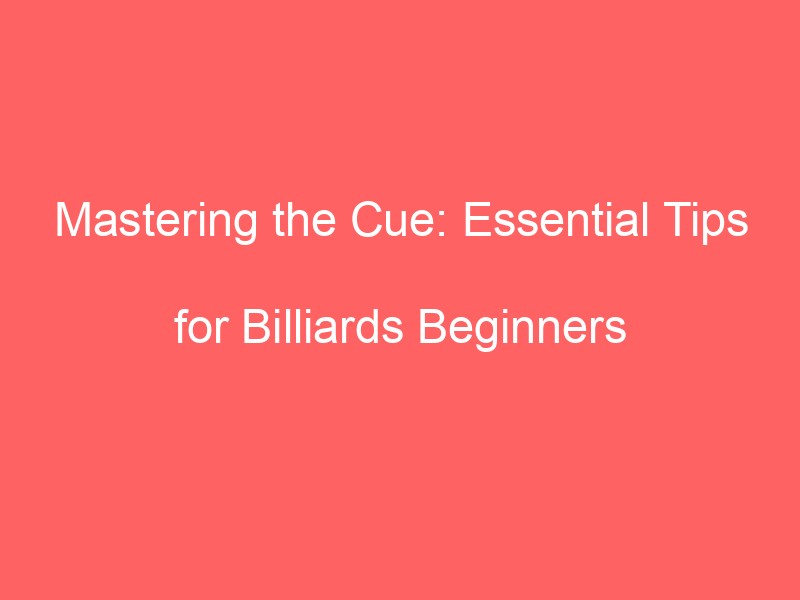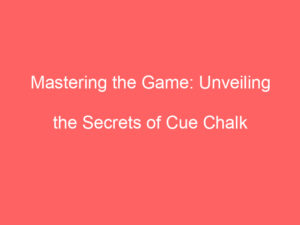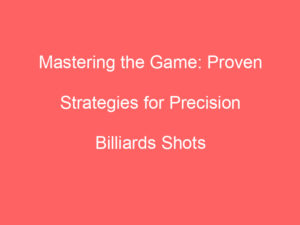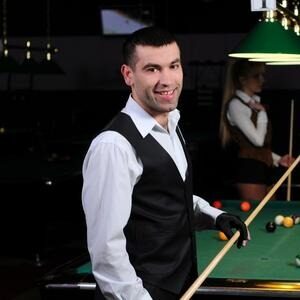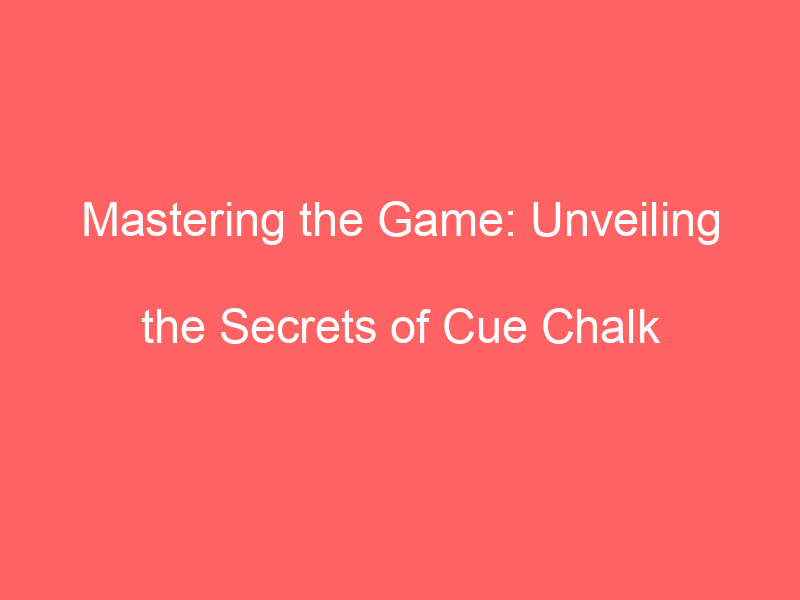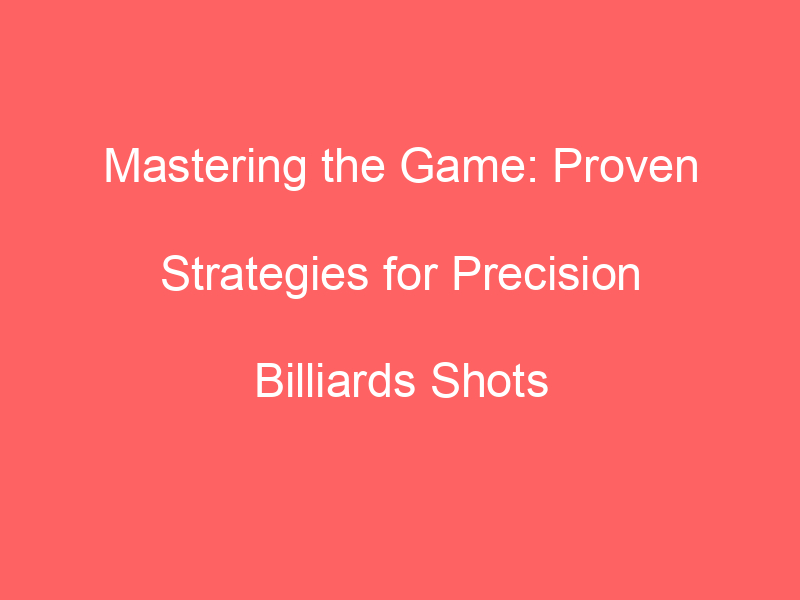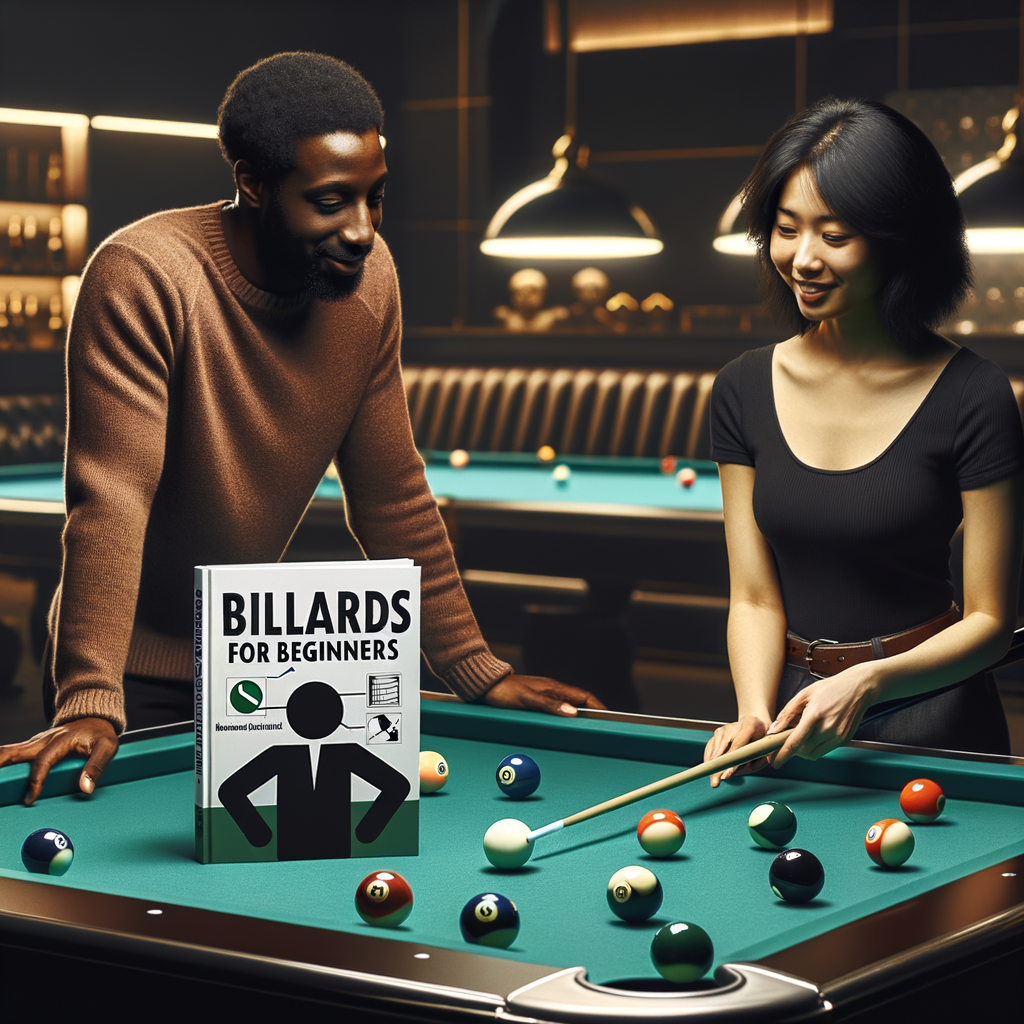
Introduction to Billiards for Beginners
Welcome to the exciting world of billiards! This game, with its rich history and strategic gameplay, is an excellent choice for beginners looking to dive into a new hobby. In this section, we will explore the basics of billiards and why it’s a great game for beginners.
-
- Understanding the Game of Billiards
Billiards is a cue sport that involves hitting billiard balls with a cue stick on a cloth-covered table bounded by elastic bumpers known as cushions. The objective varies depending on the specific game type, but generally, players aim to strike the balls into one of the table’s pockets.
While there are many variations of billiards, the most popular types include pool, snooker, and carom billiards. Each type has its own unique set of rules and strategies, making the game of billiards a diverse and engaging activity.
-
- Why Billiards is a Great Game for Beginners
Billiards is a fantastic game for beginners for several reasons. Firstly, it’s easy to learn but challenging to master, providing a rewarding experience as you improve your skills. Secondly, it’s a social game that can be enjoyed with friends and family, fostering a sense of community and camaraderie.
Moreover, billiards is a game of strategy and precision, helping to sharpen your focus and decision-making abilities. It’s not just about physical skill; it’s also about outsmarting your opponent and planning your moves ahead of time.
Whether you’re looking to pick up a new hobby, improve your strategic thinking, or simply have fun with friends, billiards is a great choice. So grab a cue stick and let’s dive into the fascinating world of billiards!
Starting in Billiards: The Basics
Before you can master the game of billiards, it’s essential to understand the basics. This includes familiarizing yourself with the equipment used in the game. Let’s delve into the world of billiards equipment.
Billiards Equipment
Billiards equipment is the backbone of the game. It’s what you use to play and score points. Here are the three main pieces of equipment you need to know about:
-
- Understanding the Cue
The cue is your primary tool in billiards. It’s a long, slender stick that you use to strike the billiards balls. Cues can vary in weight and length, but a standard cue is about 57-58 inches long and weighs between 17 and 21 ounces. The tip of the cue, known as the ferrule, is usually made of leather and is used to hit the ball. Understanding the cue and how to handle it is crucial for a good game.
-
- Types of Billiards Balls
There are two main types of balls in billiards: object balls and the cue ball. The object balls are the ones you aim to pocket, and the cue ball is the one you strike with the cue. In a standard game, there are 15 object balls numbered 1 through 15 and one cue ball. The balls numbered 1-7 are solid colors, while those numbered 9-15 are striped.
-
- Billiards Table Dimensions
The standard billiards table size for professional play is 9 feet by 4.5 feet. However, smaller tables are also common, especially for home use. Regardless of the size, all tables have six pockets: one in each corner and one in the middle of each long side. The surface of the table is covered with a special cloth, often green, to allow the balls to roll smoothly.
Understanding these basics will set you on the right path to becoming a skilled billiards player. Remember, practice makes perfect, so don’t be discouraged if you don’t get it right the first time. Keep practicing, and soon you’ll be playing like a pro!
Billiards Rules
Before you can become a master at billiards, you must first understand the basic rules and common fouls. These guidelines ensure fair play and add a layer of strategy to the game. Let’s dive in!
- Basic Rules of Billiards
The game of billiards, also known as pool, is played on a rectangular table covered in green felt. The objective is to use a cue stick to hit the cue ball, which then hits the other balls and aims to pocket them into one of the six holes on the table. Here are some basic rules:
- The game begins with the break shot. The player must hit the cue ball into the triangle of balls at the other end of the table.
- Each player has a designated set of balls (either stripes or solids) that they must pocket. The first player to pocket all of their balls and then the 8-ball wins the game.
- If a player pockets the cue ball or fails to hit any balls, it’s considered a foul and their turn ends.
- If a player pockets the 8-ball before they’ve pocketed all of their designated balls, they lose the game.
- Common Fouls and Penalties
Just like any other game, billiards has its fair share of fouls and penalties. Here are some of the most common ones:
| Foul | Penalty |
|---|---|
| Scratching the cue ball (pocketing the cue ball) | Opponent gets ball in hand |
| Failing to hit any balls | Opponent gets ball in hand |
| Hitting an opponent’s ball first | Opponent gets ball in hand |
| Pocketing the 8-ball early | Automatic loss of game |
Remember, the key to avoiding fouls is to play with precision and strategy. Keep practicing and soon you’ll be a pro at avoiding these common pitfalls!
Billiards Tips for Beginners: Improving Your Game
Improving your billiards game is a journey that requires patience, practice, and a good understanding of the basics. Here, we will discuss some essential billiards techniques that can help beginners elevate their game.
Billiards Techniques
Mastering these techniques will not only improve your game but also increase your confidence at the table.
- How to Hold the CueThe correct way to hold a cue stick is crucial to your game. Place your dominant hand at the back of the cue. Your grip should be firm but relaxed. Your other hand, the bridge hand, supports the cue stick closer to the tip. The thumb and index finger form a V-shape that guides the cue.
- Perfecting Your AimAiming is an art in billiards. Start by visualizing the path your ball needs to take to hit the target. Then, align your cue stick with that path. Practice this technique regularly to improve your accuracy.
- Mastering the Break ShotThe break shot is the first shot in a game of billiards, and a good break can set the tone for the rest of the game. Position the cue ball close to the head string. Aim for the center of the front ball with enough force to scatter the other balls. Remember, practice makes perfect!
By practicing these techniques, you can significantly improve your game. Remember, the key to becoming a better billiards player is patience and persistence. Keep practicing, and you’ll see improvement in no time!
Strategies for New Billiards Players
As a new player, mastering the game of billiards requires more than just understanding the basics. It involves developing a strategic approach to the game. Here are some strategies that can help you improve your game:
-
- Planning your shots
Planning your shots is a crucial strategy in billiards. It’s not just about hitting the ball; it’s about planning where the ball will go after you hit it. This requires a good understanding of angles and physics. For example, if you want the ball to go to the right, you need to hit it on its left side. Practice this strategy to improve your game.
-
- Defensive play strategies
Defensive play is another important strategy in billiards. Sometimes, the best shot is not the one that scores, but the one that leaves your opponent with no good shot. This could mean hitting the ball in such a way that it ends up near a wall, or blocking the path to the pocket with another ball. Remember, billiards is not just about scoring; it’s also about preventing your opponent from scoring.
-
- Understanding ball spin and its effects
Understanding how spin affects the movement of the ball can significantly improve your game. When you hit the ball off-center, it creates spin, which can change the ball’s direction after it hits a wall. For example, a right spin (hitting the ball on the left) will make the ball turn right after hitting a wall. Practice different spins to see how they affect the ball’s movement.
Remember, mastering these strategies takes time and practice. Don’t be discouraged if you don’t get it right away. Keep practicing, and you’ll see improvement in your game.
Beginner’s Luck in Billiards: Myths and Facts
When it comes to billiards, many beginners attribute their early successes to what is commonly referred to as ‘beginner’s luck.’ But how much of this is based on fact, and how much is merely myth? Let’s delve into this interesting topic.
- Debunking common billiards myths
One of the most common myths in billiards is the concept of ‘beginner’s luck.’ The belief is that beginners often win games because they are ‘lucky.’ However, this is not entirely true. While luck can play a small role in any sport, billiards is a game of skill, strategy, and precision. A beginner may win a few games due to the unpredictability of their play style, which can throw off more experienced players. But over time, as patterns emerge, this advantage diminishes.
Another myth is that hitting the balls harder results in better outcomes. This is not the case. In fact, hitting the balls too hard can lead to loss of control, resulting in missed shots or fouls. The key is to strike with just the right amount of force and precision.
- Understanding the role of luck in billiards
While it’s easy to attribute a surprising win or a lucky shot to ‘beginner’s luck,’ it’s important to understand that billiards is a game of skill. Luck can sometimes influence the outcome of a game, but it’s not a reliable strategy for consistent wins. A ‘lucky’ shot is often the result of a lack of precision or control, which can just as easily result in a missed shot or a foul.
In conclusion, while ‘beginner’s luck’ can make for a fun story, it’s not a reliable strategy for success in billiards. Instead, focus on improving your skills, understanding the game, and developing effective strategies. Remember, every master was once a beginner. So, keep practicing, and soon you’ll be winning games not because of luck, but because of your skill and strategy.
Learn to Play Billiards: Practice Exercises
Mastering billiards is not just about understanding the rules and strategies. It also requires consistent practice and the development of essential skills. In this section, we will introduce you to some practice exercises that can help you improve your game.
Drills for Billiards Beginners
As a beginner, it’s important to start with the basics. Here are a couple of drills that can help you improve your aim and cue control, two of the most crucial aspects of billiards.
-
- Practice drills for improving aim
Improving your aim in billiards is all about precision and consistency. Here’s a simple drill to help you with that:
-
-
- Set up a ball on the table, and aim to hit it into a pocket. Don’t worry about the other balls for now.
- Try to hit the ball into the pocket from different angles and distances. This will help you understand how the angle and force of your shot affect the trajectory of the ball.
- Repeat this drill until you can consistently hit the ball into the pocket from various positions on the table.
-
This drill will help you develop a better understanding of angles and how to aim accurately.
-
- Exercises for better cue control
Cue control is another critical aspect of billiards. Here’s an exercise to help you improve:
-
-
- Place a ball on the table, and aim to hit it straight into a pocket.
- Focus on your cueing technique. Make sure your cue is level, and your stroke is smooth and straight.
- Try to hit the ball with different amounts of force to see how it affects the ball’s speed and direction.
- Repeat this exercise until you can consistently control the speed and direction of the ball.
-
This exercise will help you develop better cue control, which is essential for making accurate and strategic shots in billiards.
Remember, practice makes perfect. The more you practice these drills, the better your aim and cue control will become. So, grab your cue stick and start practicing!
Case Studies: Successful Billiards Beginners
Everyone starts somewhere, and in billiards, even the most successful players began as beginners. Let’s explore some inspiring stories of individuals who started from scratch and rose to the top in the world of billiards. We’ll also delve into the valuable lessons we can learn from their experiences.
-
Story of Jeanette Lee: The Black Widow
Known as the “Black Widow,” Jeanette Lee started playing billiards at the age of 18. Despite suffering from scoliosis, she became one of the most recognized female billiards players in the world. Her determination and resilience are a testament to the fact that physical challenges can be overcome with the right mindset.
Lessons Learned
From Jeanette’s story, we learn the importance of perseverance and determination. No matter the obstacles, with hard work and dedication, you can achieve your goals.
-
Story of Efren Reyes: The Magician
Efren “Bata” Reyes, also known as “The Magician,” is a world-renowned billiards player from the Philippines. He started as a billiards attendant and through consistent practice and a passion for the game, he became a world champion. His story is a classic example of “from rags to riches.”
Lessons Learned
Reyes’ journey teaches us that passion and consistent practice are key to mastering billiards. It also shows that humble beginnings should not deter us from aiming high.
-
Story of Allison Fisher: The Duchess of Doom
Allison Fisher, known as the “Duchess of Doom,” is a British professional pool player. She started playing snooker at a young age and later transitioned to pool. Her story is a testament to the fact that it’s never too early to start, and it’s okay to switch paths if it leads to your passion.
Lessons Learned
From Fisher’s story, we learn the importance of starting early and being open to change. It’s never too early to start learning, and it’s never too late to pursue your passion.
These stories of successful billiards players who started as beginners should inspire you to start your own journey in billiards. Remember, every expert was once a beginner. So, pick up that cue stick and start practicing!
Conclusion: Your Journey in Billiards
As we wrap up this comprehensive guide to billiards for beginners, let’s take a moment to reflect on the journey you’re about to embark on. Billiards is a game of skill, strategy, and sometimes, a little bit of luck. But above all, it’s a journey of continuous learning and improvement.
-
- Recap of billiards tips for beginners
We’ve covered a lot of ground in this guide, from the basics of billiards to tips for improving your game. We’ve debunked myths and shared some inspiring stories of successful beginners. Here are the key takeaways:
-
-
- Understand the basics: Know your cue, the balls, and the table. Learn how to hold the cue correctly and how to aim.
- Practice makes perfect: Regular practice is the key to improving your game. Try out different practice exercises to hone your skills.
- Learn from others: Watch professional players, learn from their techniques, and apply them to your game.
- Patience is key: Don’t get discouraged if you don’t see immediate results. Improvement takes time and patience.
- Encouragement for continuous learning and practice
-
Remember, every professional player started as a beginner. The journey to becoming a skilled billiards player is a marathon, not a sprint. It’s about continuous learning, practice, and improvement. Don’t be afraid to make mistakes – they’re part of the learning process. Keep practicing, stay patient, and most importantly, enjoy the game.
Billiards is not just a game, it’s a journey. A journey of learning, improvement, and fun. So grab your cue, step up to the table, and start your journey. Good luck!
